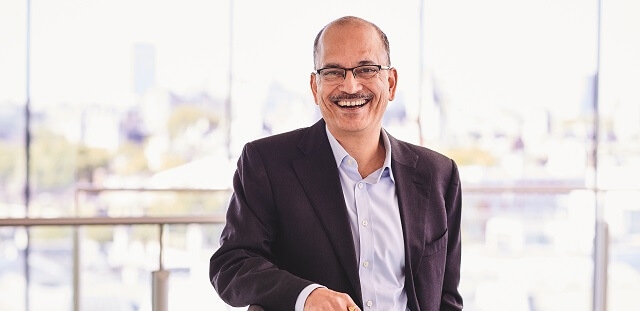Nitin Paranjpe: Highest-Ranking Foreign Non-Executive in Next50 2022

Author: Marike van Zanten | 09-03-2022
Transformation Can Be Learned Young
When Nitin Paranjpe (1963) was 44, he became the youngest CEO ever of Hindustan Unilever Limited (HUL), the Indian publicly traded subsidiary of this British multinational. He joined the company in 1987. It was 2008 and the world was in crisis. HUL’s turnover and profits were stagnating, stocks dropping and they were losing appeal as an employer. Paranjpe managed to achieve a turnaround in four years. The young leader gained inspiration from management guru C.K. Prahalad, who taught him to differentiate between managerial and entrepreneurial thinking styles, he told Forbes India. Managers’ ambitions (A) equal their resources (R): the goal is a stable situation, even in a changing world. “No entrepreneur ever starts out by believing that A=R. They have few resources or none at all, but they dream big.”
Learning To Use Facebook and Twitter
While at HUL, Paranjpe strove to encourage an entrepreneurial spirit – always a challenge at an established company – asking people to rely on their hearts, not their resources, to push targets further and commit to digitization. He engaged a 25-year-old reverse mentor of his own, arranged to have Google teach his 100 best managers digital skills and implemented Mission Bushfire throughout the company, with all staff visiting stores in order to explore customers’ and retailers’ concerns.
Challenging Task
After heading Unilever’s Home Care and Foods & Refreshment divisions, Paranjpe became the company’s COO in 2019. On April 1, 2022, he will assume a new position as Chief of Transformation and Chief People Officer in the context of the current organizational restructuring, with associated losses of 1,500 management jobs; 15% senior management and 5% juniors. No easy task, and that is in addition to Paranjpe’s duties as non-executive director at brewer Heineken, who are facing their own difficulties due to the Covid crisis, supply chain issues and inflationary pressures. However, all these factors fade into irrelevance compared to events on November 26, 2008. On this day, Hindustan Unilever’s top executives and their spouses gathered at the Taj Mahal Palace & Tower Hotel in Mumbai to say their farewells to departing CEO Patrick Cescau and welcome his successor Paul Polman. Due to a Jihadist attack on the hotel, they were forced to hide away all night and barely made their escape. In Rashmi Bansal’s book Shine Bright, Paranjpe looks back on the attack. “Even at the time, there was no need for my wife and I to discuss anything… She knew I would be last to leave the room.”
